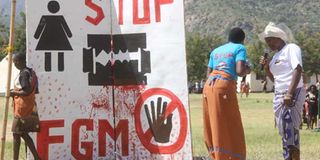War on FGM is being won as community shifts mind

World Anti-FGM activists from various universities enact a play campaigning against female genital mutilation during the International Day of Zero Tolerance on Female Genital Mutilation marked at Kerio Valley Boys Secondary Scholl in Tot, Elgeyo-Marakwet County on February 06, 2016. PHOTO | FILE
What you need to know:
The State needs to reassert its obligations under national, regional and international laws to prevent FGM, protect victims, and prohibit and prosecute related offences.
There are best practices on ending FGM by independent projects or interventions that bring on board influential groups.
With more than 5,000 new female genital mutilation cases recorded in England alone, FGM is no longer a Kenyan or African issue; it is global.
In a United Kingdom first, a 37-year-old woman of Ugandan origin was convicted in East London for mutilating her three-year-old daughter.
Although it has no health benefits, young girls are subjected to the dangers of FGM — including severe bleeding, problems while urinating, infections, cysts, infertility and increased risk of childbirth complications and newborn deaths.
ARRESTED
The World Health Organization estimates that 120 to 140 million women and girls have been subjected to FGM. Further, 91.5 million females over nine years in Africa are living with the consequences of the heinous act, which is practised in 30 countries in the continent and in others in Asia and the Middle East.
Kenya’s penal code outlaws the deliberate infliction of ‘grievous bodily harm’ on anyone and the Children Act 2001 prohibits FGM and other harmful practices that ‘negatively affect’ children under 18. The Prohibition of Female Genital Mutilation Act 2011 criminalises the practice in the country in a bid to have the practice abandoned. Kenya also now has an Anti-FGM Board, a semi-autonomous government agency that coordinates civil society organisations (CSOs) and agencies in the fight against this vice.
During the long November-December school holidays, the “FGM season”, 10 women in Narok County who participated in the activities were arrested, as well as a mother of twins in Chuka, Tharaka-Nithi County. That shows communities are gradually having a mind shift; they are reporting cases of FGM and turning their back to it.
The war against FGM is being won. Even better is that other governments plan to give in aid money to help in eradicating FGM in Africa. The UK has pledged £50 million (Sh6.5 billion).
The narrative on FGM needs to change. Terms that are used when describing FGM are construed as racist, imperialistic and undermining the power and dignity of women — such as ‘barbaric’ and ‘horrific’.
REPRODUCTIVE
The media and society need to redefine young girls and women who are survivors of FGM by not only focusing on the experience (pain and shame) but also telling encouraging stories that show them as ‘victors’ and not ‘victims’ who have overcome and are empowered to help others.
And what is up with the use of gory pictures of razor blades and knives and other unsterile equipment to show the unsanitised methods used in the past, as if to suggest a narrative that FGM carried out in sanitised conditions or medicalised is okay? Can we just focus on the violation of the rights of girls and women?
The State needs to reassert its obligations under national, regional and international laws to prevent FGM, protect victims, and prohibit and prosecute related offences.
There has been an evident increase in law enforcement by officers across the country and an improvement in coordination of efforts by institutions charged with prevention, response and rehabilitation of victims of FGM. Additional resources for good legislation that criminalises FGM and ease of access to services such as sexual reproductive health education and specialised counselling for survivors should be considered.
There are best practices on ending FGM by independent projects or interventions that bring on board influential groups such as the Njuri Ncheke. The Meru council of elders are strong anti-FGM agents who hold public declarations to emphasise its illegality and retrogressive nature.
RECOGNITION
Reforming female circumcisers through training on child protection, social and legal implications of the practice and supporting them in economic empowerment as an alternative livelihood to build basic entrepreneurial skills and improve household income is critical to the war.
The fight against FGM cannot be won in isolation and, therefore, there is a need to work with boys and men in demystifying the myths around it as a prerequisite to marriageability of girls, especially in a patriarchal communities, as they are the key decision makers and the ‘end consumers of the product’. The issue of early child marriage as a result of the practice also arises.
On today’s Zero Tolerance to Female Genital Mutilation Day, I am particularly challenged by girls doing it for themselves. The mobile application i-Cut, which connects girls affected by FGM to legal and medical assistance, was developed recently by four Kenyan girls, all students aged 16-18. The group received a global recognition and has christened themselves as ‘restorers’, who aim to prevent FGM.
Ms Maina-Vorley is the country director for Plan International Kenya. [email protected]




